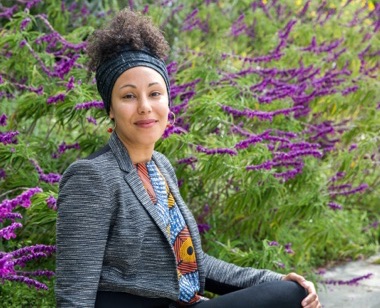Associate Professor of Sociology Camilla Hawthorne’s latest book, Contesting Race and Citizenship, explores how Black Italians are fighting for change against the country’s restrictive citizenship laws. In Italy, citizenship is based primarily on descent or “blood,” which means children inherit citizenship if they have at least one Italian parent. But this system has meant that an estimated 600,000 to 900,000 Italian-born children of immigrants are not guaranteed citizenship in the country where they were raised. Among those are many Italians of African descent.
Hawthorne, who is herself the daughter of an African American father and an Italian mother, is a bilingual dual citizen who grew up splitting her time between the United States and Italy. Those experiences inspired her research into the unique and thorny intersections of race and citizenship in Italy.
“I'm an Italian citizen due to the same law that disenfranchises so many of my fellow Black Italians,” she said. “So I became really interested in understanding the racial histories of citizenship and how citizenship became a key strategy in Black anti-racist politics in Italy.”
For the past decade, Hawthorne has delved into these topics, often by learning from and working alongside Black activists, artists, and entrepreneurs in Italy. She also studied media coverage of migration and citizenship issues in the country, explored the creative and philosophical work of Black Italians, immersed herself in relevant social media spaces, and dug through archives to trace the history of how race and geography relate to Italian national identity.
Contesting Race and Citizenship shares findings from this research. The book sheds light on how a unique form of racism arose in the late-19th century as Italy sought to be accepted as European by differentiating itself from Africa. This new form of racial politics reimagined the Mediterranean as a dividing line, rather than the place of cultural, racial, and ethnic exchange that it had long been. Hawthorne sees echoes of this historical shift in the assertions of modern rightwing politians that Italy could lose its identity by being “overrun” with migrants and refugees from Africa. She says it has really only been within the last five to 10 years that Italian historians have begun to reckon with the country’s long history of racism.
“The prior common sense had been that, because Italy is this mixed Mediterranean nation, racial categories had always been really fluid until the influence of Hitler on Mussolini led Italy to become a racial state during the fascist period,” she explained. “But what the archives show is that the ideology of trying to define Italianness and Italian citizenship through race has been around as long as the state of Italy.”
This is the social and historical context within which the Italian-born children of Black immigrants are now pushing for access to citizenship, and the book describes how activists have navigated that. Hawthorne says the movement is currently engaged in a careful balancing act. On the one hand, Black activists who were born in Italy are eager to assert their Italianness, and on the other, many also feel solidarity with first-generation migrants arriving from Africa. So they’re looking for ways to push for citizenship that don’t undermine the needs and rights of others.
“Citizenship matters and brings material benefits, but it’s also a practice of exclusion, where someone will always be on the outside,” Hawthorne said. “So we also have to think about what kinds of solidarities get precluded when citizenship is the only focus. And what I’ve seen over time is that activists are still focusing on citizenship, but it’s not the end of their politics; they also see diasporic kin arriving as refugees and don’t think of those struggles as being separate.”
One area where Hawthorne sees a need for caution in how citizenship struggles are framed is the realm of Black entrepreneurship. Black-owned businesses are a source of immense pride and cultural celebration among Black Italians, and entrepreneurship has provided opportunities for women to build community and promote non-Eurocentric forms of beauty. But some entrepreneurs also hold up their economic contributions as evidence of their “worthiness” for citizenship, and this argument appears frequently in media coverage, too.
In the book, Hawthorne discusses how this justification may backfire. She says it can be used to legitimize economic exploitation of immigrants and their children under the guise of celebrating “hardworking” individuals. At the same time, this line of reasoning marginalizes groups like refugees or people with disabilities who might be labeled as economically “unproductive.”
Contesting Race and Citizenship also details how building broader solidarities to combat anti-Black racism in Italy has required activists to develop a new vocabulary for social change. For example, while first-generation immigrants have traditionally been more likely to identify by their family’s specific country of origin, their children now also embrace terms like Black Italian or Afro Italian, in recognition of the shared experiences that come with growing up Black in Italian society. Activists have also had to adapt terms from other languages or define new ones to capture the unique circumstances of racial injustice in Italy.
Increasingly, the movement has sought to navigate issues of race and citizenship in both local and global contexts. Hawthorne says the Black Lives Matter protests in 2020 showed how exciting new forms of resistance and solidarity may arise from those efforts.
“Making Black lives matter in Italy means thinking about access to citizenship, the deaths of refugees crossing the Mediterranean, and the exploitation of undocumented migrants in agricultural labor, as well as police brutality,” she said. “During that moment, a lot of people were thinking about Black politics in Italy beyond just citizenship reform and seeing this whole constellation of issues that are connected through the regime of racial capitalism and colonialism. It’s a great example of how we can mobilize together across the diaspora.”



